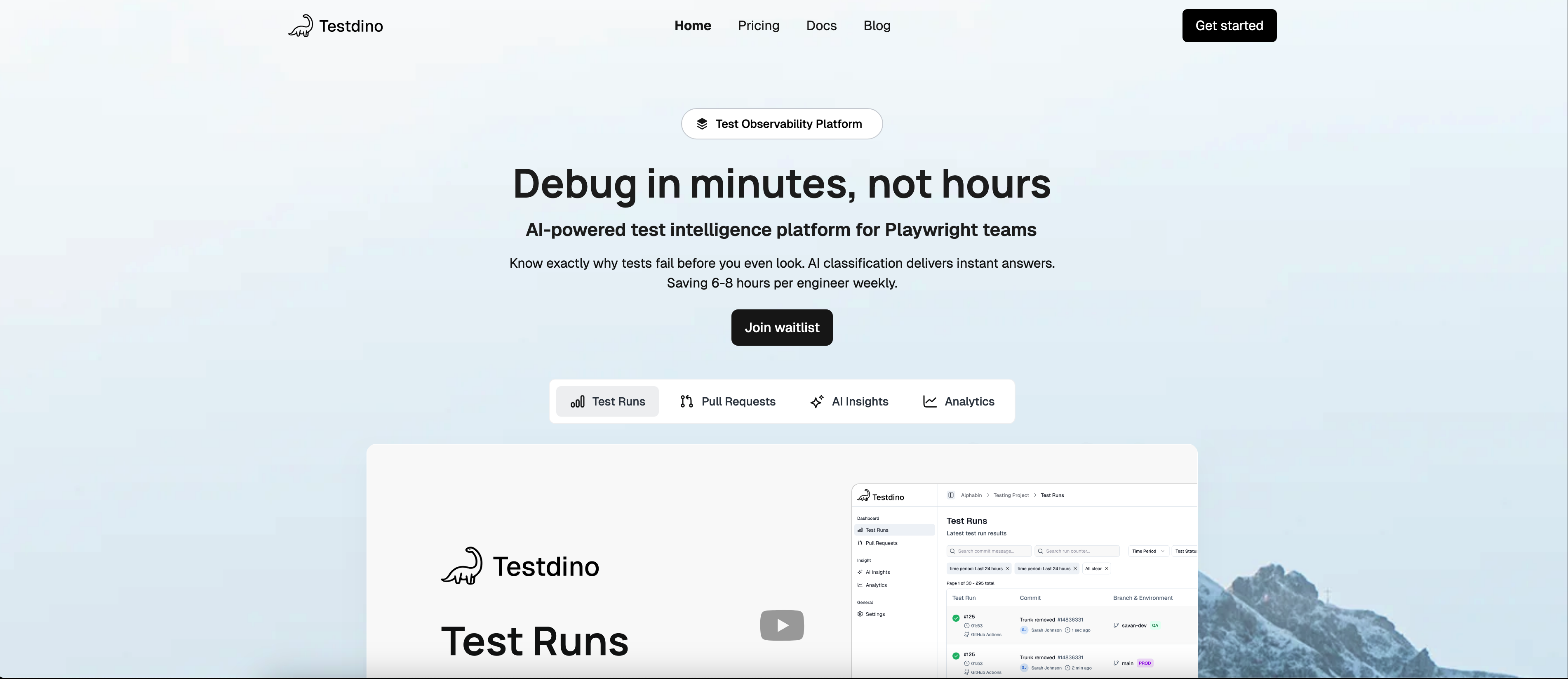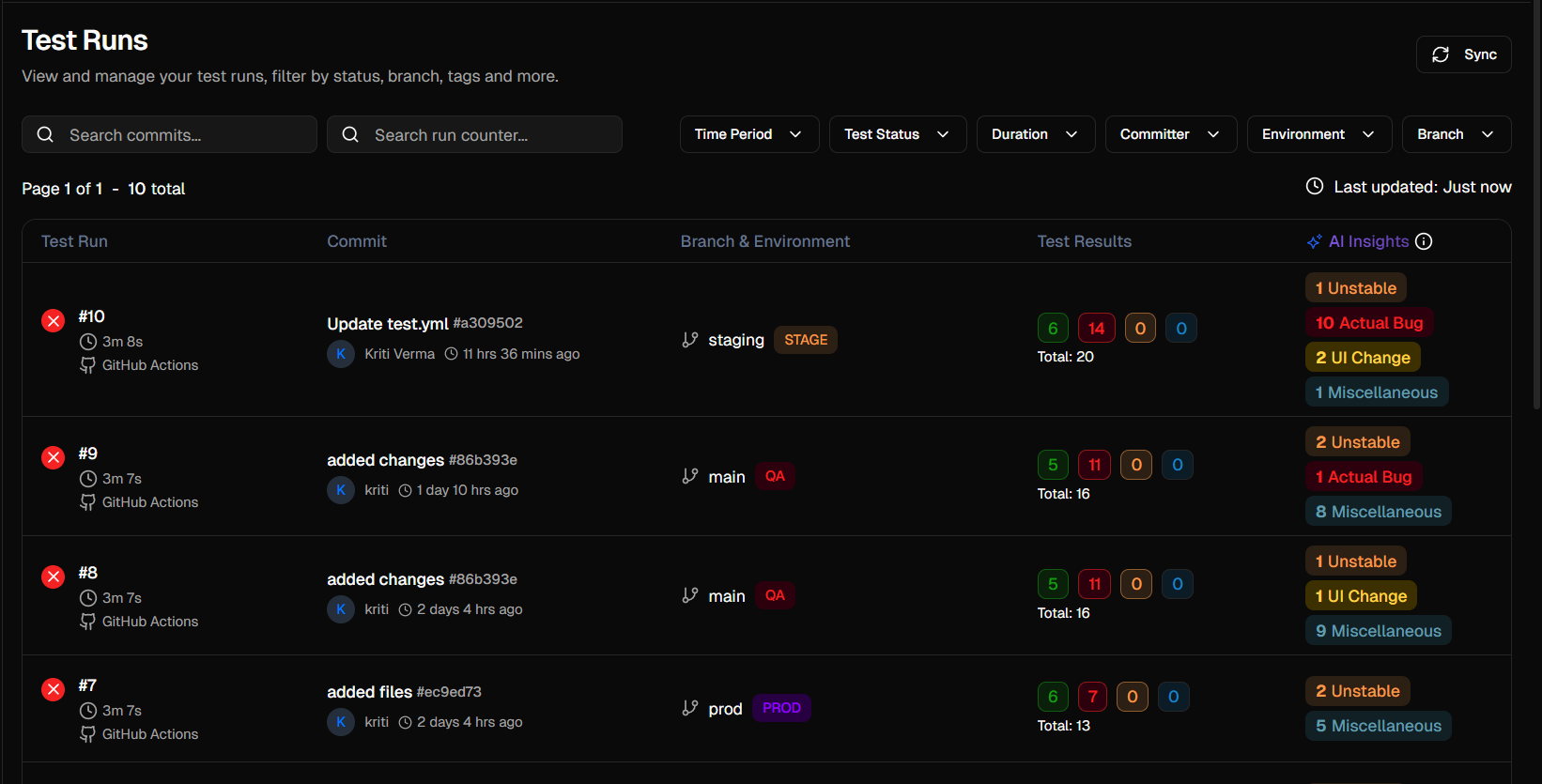MuukTest introduced Amikoo, an AI-driven agent designed to expedite the creation and automation of regression test suites. This innovation aims to reduce the time and cost traditionally associated with manual test development, positioning itself as the low-code, no-code solution for teams without automation expertise.
While MuukTest promises a streamlined solution, many teams are exploring alternatives to better meet their needs. This blog presents you with top alternatives and makes a compelling case for why Alphabin is the best MuukTest alternative for companies in 2025.
From advanced analytics to flexible pricing and full-spectrum test coverage, Alphabin is purpose-built to meet the modern demands of QA teams.
Why Companies Seek MuukTest Alternatives
1. Reporting and analytics gaps
MuukTest offers foundational reporting, such as pass/fail rates and execution times. However, modern QA teams need more than binary results. They need to understand why tests fail, which failures matter, and how to fix them fast.
The numbers support this frustration. According to industry research, 72.3% of teams are actively exploring AI-driven testing workflows in 2025. They want intelligent analytics, not just raw data. MuukTest's test reporting hasn't evolved to meet this demand.
{{cta-image}}
2. Concurrency limits and scalability challenges
MuukTest’s standard plans offer limited parallel tests, and additional parallel executions come with added costs, potentially affecting scalability.
This pricing structure slows down your testing velocity. Modern teams deploy multiple times daily. They can't wait hours for sequential test runs because their testing platform limits parallelization.
3. Pricing uncertainty and limited integrations
MuukTest uses per-test pricing with various add-ons, which can become costly as projects scale.
The integration story is equally concerning. Futurepedia's analysis highlights "limited third-party integrations" as a significant constraint. In 2025, your testing platform needs to connect with everything - CI/CD pipelines, issue trackers, communication tools, and analytics platforms.
4. Restricted test coverage and customization
The platform simplifies test creation to maintain its no-code promise, which may limit the ability to test complex user paths that involve multiple steps or conditional logic. As a result, you must either simplify your tests (reducing coverage) or supplement with other tools (increasing cost and complexity).
Industry data shows that 68% of organizations now use Gen AI in quality engineering, with 72% reporting faster automation cycles. They achieve this through flexible, intelligent platforms, not rigid, limited tools.
MuukTest vs Alphabin
Let's cut through marketing and compare what matters: real capabilities, actual costs, and business impact.
1. Service approach: Platform vs Partnership
MuukTest provides platform access, but users are responsible for managing tests and interpreting results. Support may be needed when challenges eventually arise.
Alphabin operates differently. Our QA architects learn your application, understand your business logic, and proactively identify coverage gaps. Think of it as gaining a QA department overnight, not just renting software.
This partnership model means:
- Continuous optimization of your test suite
- Proactive identification of problem areas
- Strategic guidance on test prioritization
- Steady support across time zones
2. Test coverage and tools
Here’s where differences become more apparent, especially for teams with broad QA needs:
While MuukTest offers functional testing, Alphabin provides a more comprehensive quality assurance solution across all layers of your application
3. Pricing and value comparison
MuukTest's pricing appears simple, but includes hidden costs:
- Tests max 15 lines of code, with extra steps counting against monthly limits.
- Only 3 concurrent tests included; more concurrency incurs additional fees.
- Support is capped at 6 hours/month; more support requires costly plan upgrades.
In contrast, Alphabin offers:
- Fixed monthly pricing with no per-test or concurrency charges.
- Unlimited parallel executions and all features included.
- Transparent, outcome-focused pricing delivering 30-50% lower total cost.
More importantly, you pay for outcomes, not activities. Our clients report 70% average cost savings while achieving better coverage and faster feedback.
{{blog-cta-1}}
Alphabin: Speed, Reporting, and Insight
While MuukTest promises no-code low-code simplicity, Alphabin delivers no-compromise quality. Here's how we transform testing from a bottleneck to a competitive advantage.
1. AI-Powered test generation
Forget recording clicks and hoping for the best. TestGenX uses AI to understand your application's logic and generate intelligent tests:
See how real browser interactions become maintainable Playwright scripts instantly, with smart locator detection and automatic assertions.
The speed difference is measurable. Teams report:
- Test creation is 5-8x faster than manual scripting
- Maintenance time reduced to near zero
- New features are tested the same day they're built
Whereas MuukTest focuses on recording-based automation, Alphabin’s TestGenX generates flexible, script-based tests that adapt over time.
{{blog-cta-3}}
3. Role-Specific dashboards and CI/CD integration
Testdino integrates deeply with your workflow:
- GitHub Actions: Trigger tests on every PR
- GitLab CI: Embed quality gates in pipelines
- Slack: Real-time failure alerts with context
- Jira: Auto-create tickets with full debugging info
Each integration is bidirectional. Test results flow into your tools, and context from those tools enhances test analysis.
Watch automated test creation for sign-up and login flows, including URL validation, visibility checks, and text verification.
{{cta-image-second}}
4. Scalability, unlimited runs, and flexible pricing
MuukTest's concurrency limits vanish with Alphabin. Run 10 tests or 10,000 - same price, same speed. Our cloud infrastructure scales automatically:
- Unlimited parallel execution
- No queuing or waiting
- Results in minutes, not hours
- Geographic distribution for global apps
Pricing stays predictable as you grow. No per-test penalties. No parallel execution fees. Just consistent, scalable value aligned with your growth.
{{blog-cta-2}}
6. Intelligent test maintenance and Self-Healing
The biggest hidden cost in test automation? Maintenance. UI changes break tests. Dynamic content causes flakes. Locators become stale.
MuukTest leaves you to fix these manually. Alphabin's AI prevents them entirely:
- Self-Healing Locators: When elements move or change, tests adapt automatically. No manual updates needed.
- Smart Retry Logic: Distinguish between real failures and timing issues. Retry intelligently, not blindly.
- Visual Regression Baselines: Detects unintended visual changes while ignoring acceptable variations.
- Automatic Updates: When you intentionally change UI, tests update themselves based on your commits.
7. Failure categorization and predictive analytics
Testdino's machine learning models analyze every test failure:
- Pattern Recognition: Identify failures that occur together, suggesting common root causes.
- Temporal Analysis: Spot failures that happen at specific times, indicating infrastructure issues.
- Code Correlation: Link failures to recent commits, accelerating debugging.
- Predictive Warnings: Alert teams when test patterns indicate upcoming instability.
8. Reducing test flakiness and maintenance
Flaky tests destroy confidence. Teams start ignoring failures, assuming they're false positives. Real bugs slip through.
Alphabin attacks flakiness systematically:
- Identify flaky tests using statistical analysis
- Diagnose root causes (timing, test data, dependencies)
- Fix automatically where possible
- Monitor to ensure stability
Making the Smart Choice
The numbers make the decision clear. Gartner forecasts that 80% of enterprises will adopt AI-augmented testing by 2027. Capgemini reports that 68% already use Gen AI in quality engineering. The future is here - the question is whether your testing platform is ready for it.
Alphabin delivers all three. Achieve 80% test coverage in just a few months, reduce testing costs by 30-50%, and ship features with confidence. TestGenX generates tests 5-8x faster than manual scripting. Testdino transforms raw data into actionable intelligence. Our QA architects work as your extended team.
For teams seeking deeper insights, flexible coverage, and long-term scalability, solutions like Alphabin present a compelling direction.
Other MuukTest Alternatives to Consider
While Alphabin delivers comprehensive AI-powered testing, other platforms serve specific niches.
QA Wolf offers fully managed Playwright automation with unlimited parallel runs and 24-hour bug fixes. They write and maintain all tests for you. The catch? Their per-test pricing model means costs could go as high as $180,000 or more annually. Great service, painful pricing.
Rainforest QA provides no-code testing through visual recordings, similar to MuukTest but with better reporting. However, they're limited to web-only testing, suffer from test flakiness as complexity grows, and use unpredictable usage-based pricing that can triple without warning.
Applause (formerly uTest) runs one of the largest crowdtesting networks, perfect for real-world usability feedback across devices and locations. The downsides include slow turnaround, high enterprise pricing, and zero automation capabilities. It's manual testing at scale.
Testlio combines vetted manual testers with basic automation, positioning itself as premium managed QA. While they excel at exploratory testing, their automation remains primitive, engagement models are rigid, and high costs for meaningful coverage.
Each alternative serves its niche, but none match Alphabin's combination of AI-powered automation, intelligent analytics, comprehensive coverage, and partnership approach.
Ready to see the difference? Book your demo today with Alphabin.



.svg)











.jpg)
